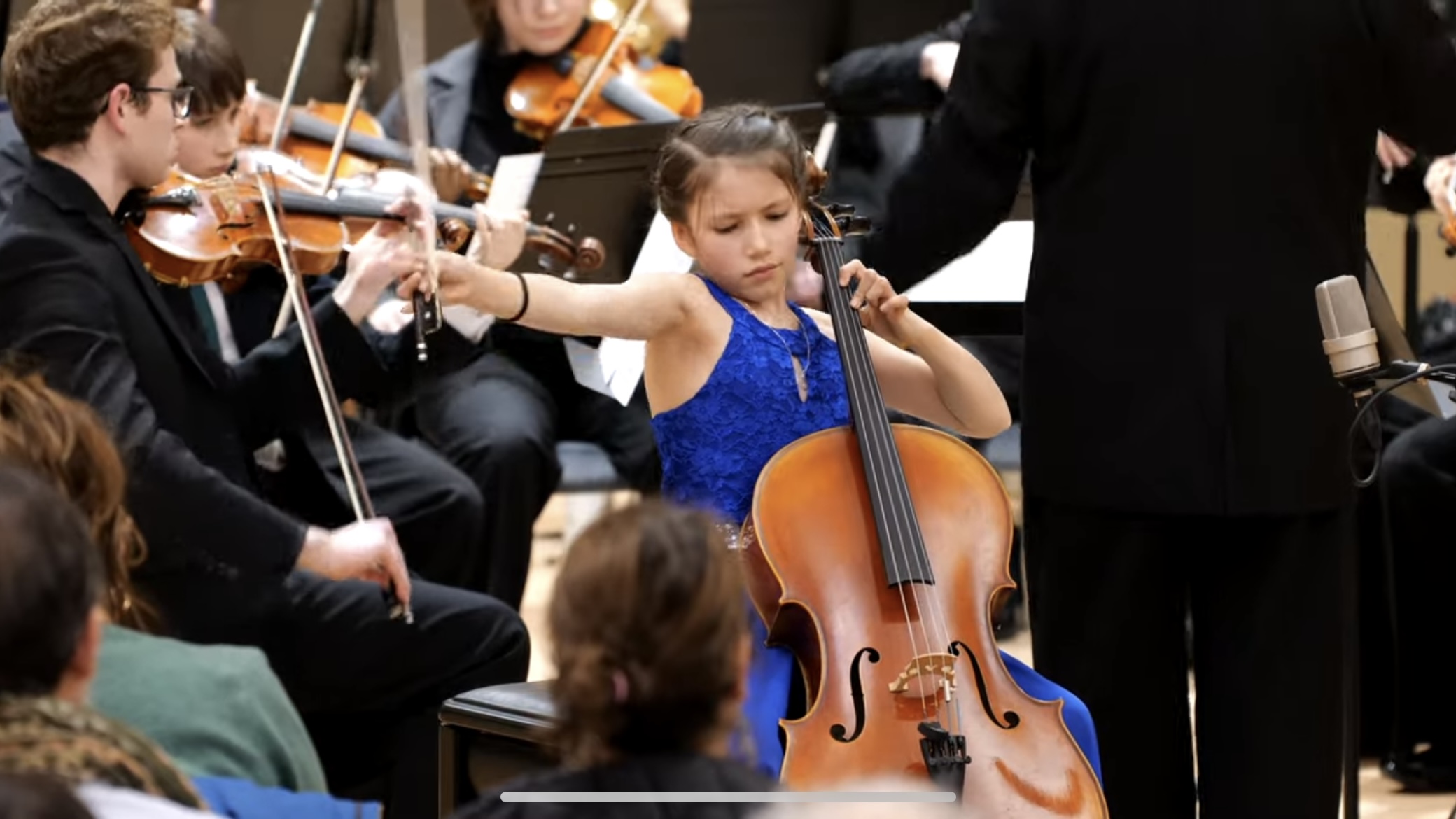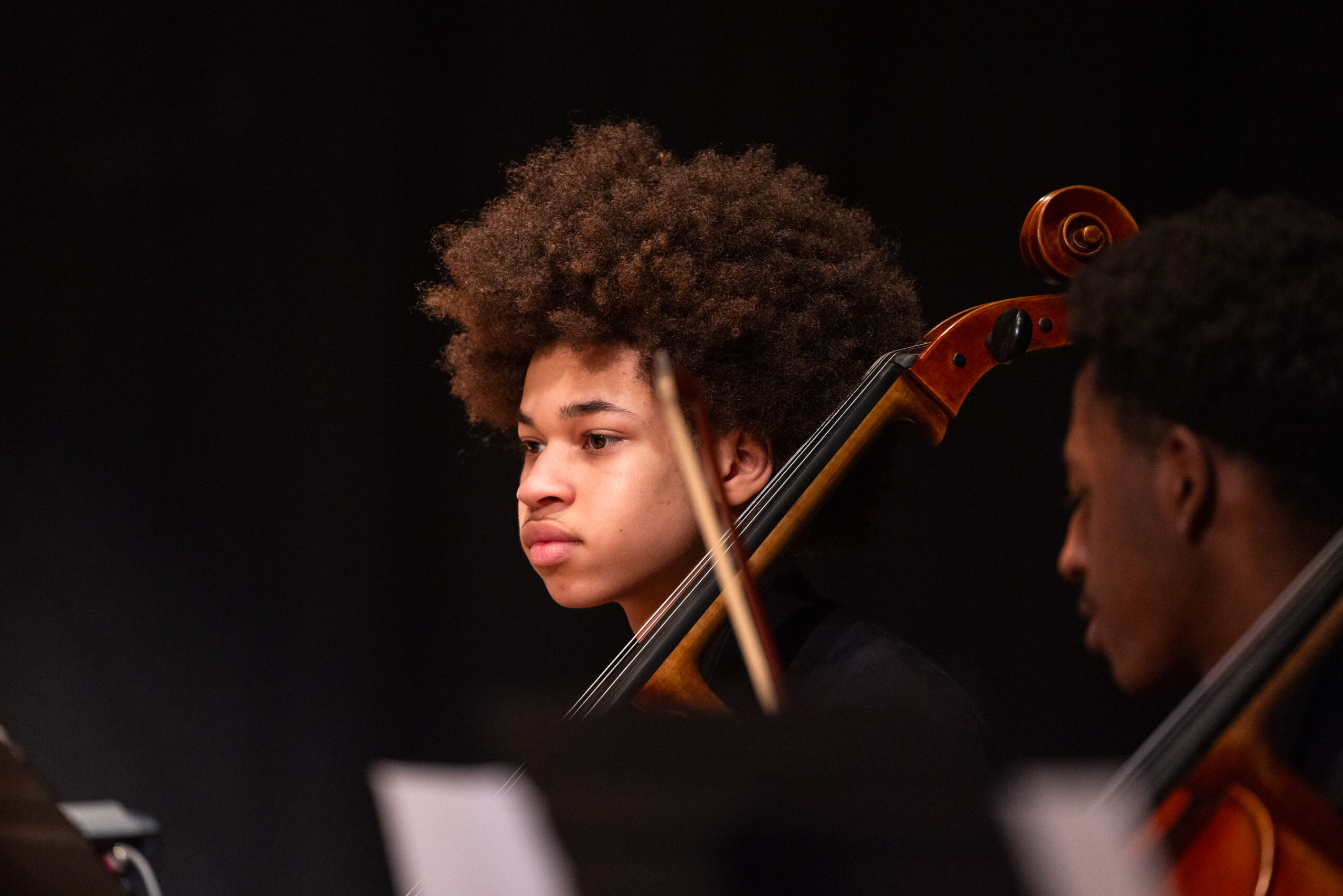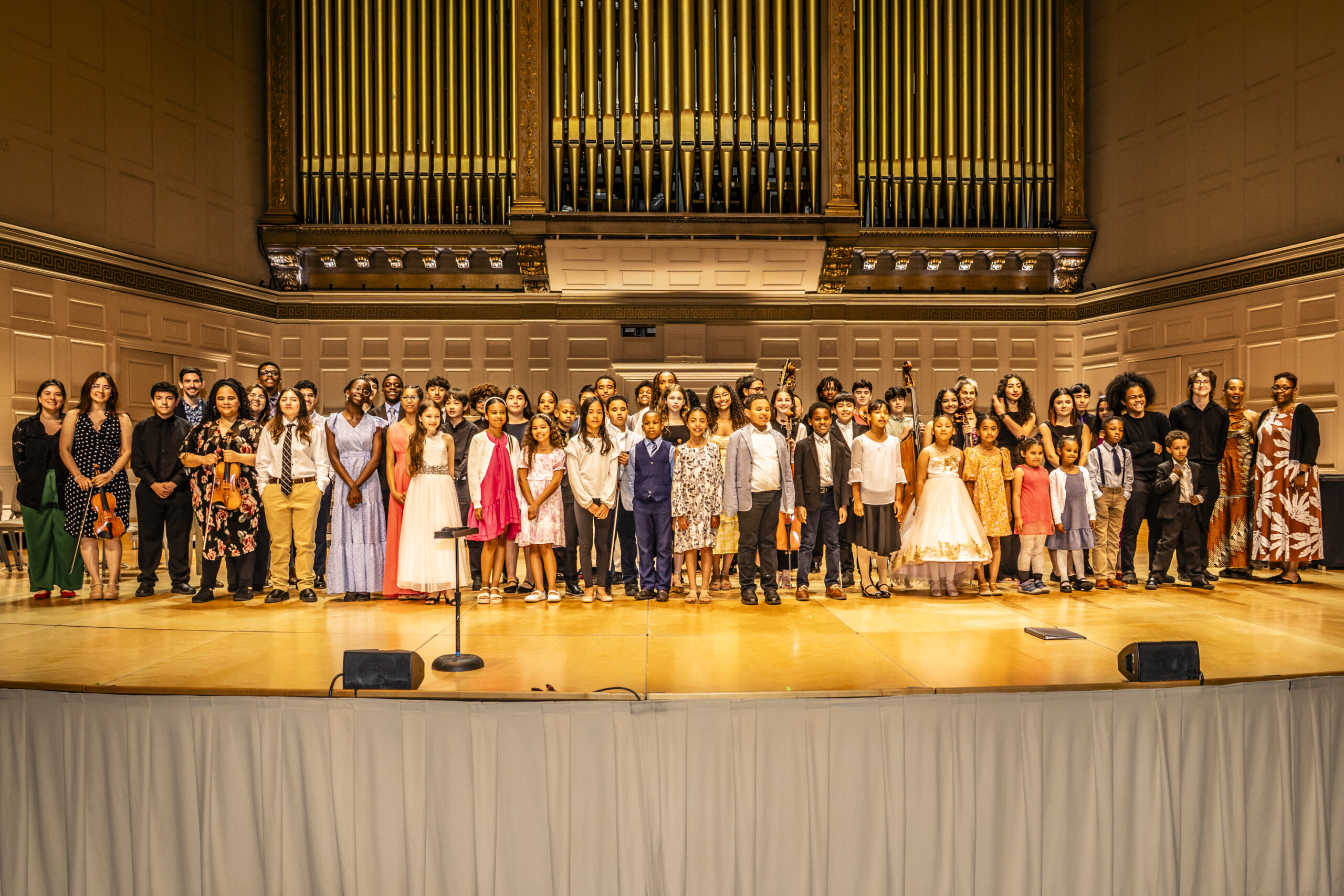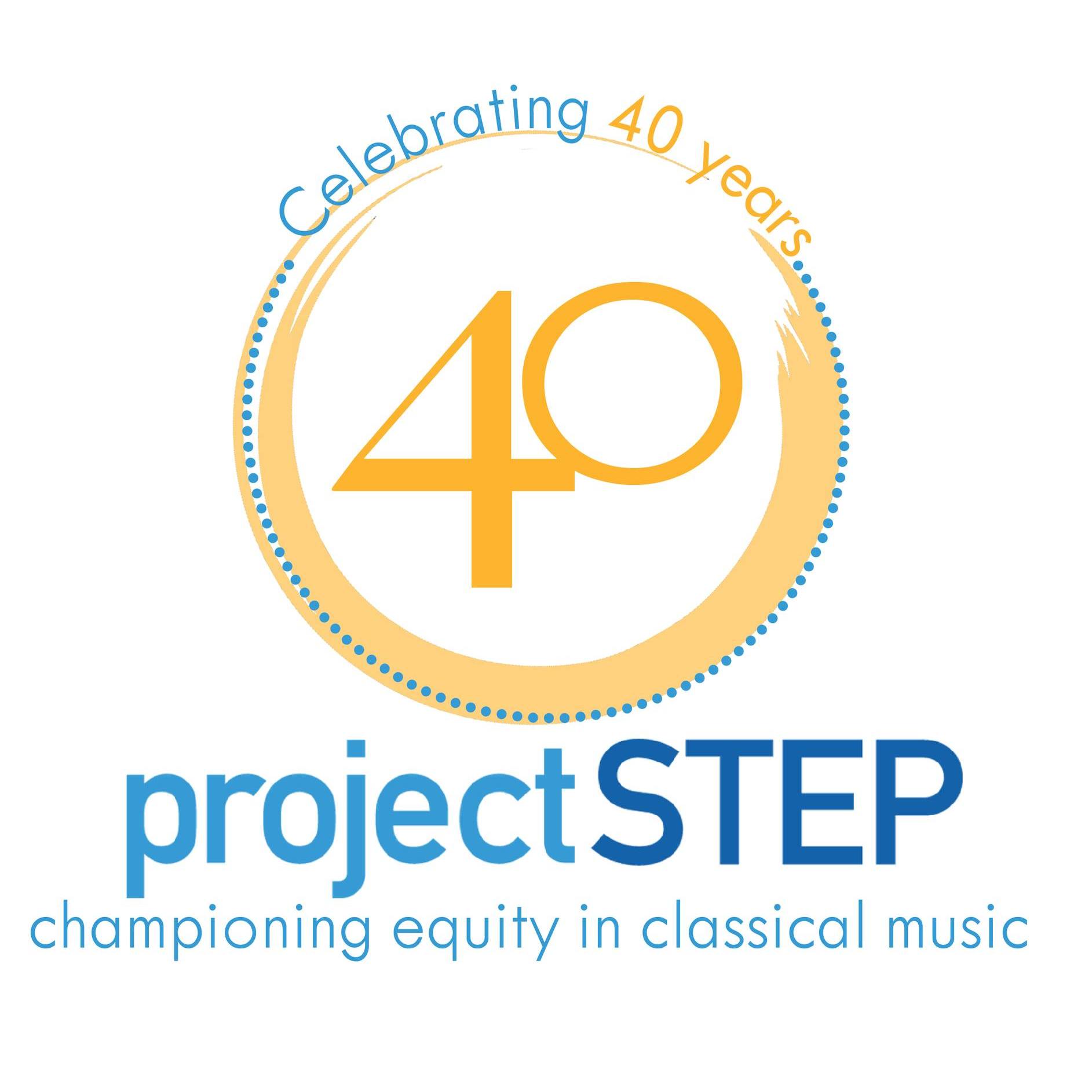Organization

Project STEP (String Training Education Program) is a nationally celebrated organization rooted in Boston, Massachusetts, committed to advancing equity, access, and excellence in classical music. Since 1982, Project STEP has transformed the classical music pipeline by providing comprehensive, long-term string instrument training to musically talented students from underrepresented communities—primarily Black and Latine youth. Its mission is both artistic and social: to prepare students for success in conservatories and professional careers, while also reshaping who belongs and thrives in the world of classical music.
Operating out of Symphony Hall, Project STEP offers an intensive, multi-year curriculum that begins as early as age five and continues through high school. Students engage in private lessons with professional musicians, chamber and orchestra ensembles, music theory classes, mentoring, and regular performance opportunities. With a deeply student-centered approach, the program offers individualized learning plans, wraparound support, and financial aid, ensuring that barriers to access are actively removed rather than passively acknowledged.
 Project STEP’s vision is bold: to ensure that the classical music profession reflects the racial and cultural diversity of the communities it serves. The organization collaborates with other leading institutions to shift systems and invest in historically excluded youth. Students regularly perform as guests with professional symphonies or chamber groups, participate in masterclasses with internationally renowned artists, and receive guidance from alumni who have gone on to excel in performance, teaching, medicine, law, and more. Alumni credit the program not just with nurturing their musical talent, but with instilling confidence, discipline, and a sense of cultural pride.
Project STEP’s vision is bold: to ensure that the classical music profession reflects the racial and cultural diversity of the communities it serves. The organization collaborates with other leading institutions to shift systems and invest in historically excluded youth. Students regularly perform as guests with professional symphonies or chamber groups, participate in masterclasses with internationally renowned artists, and receive guidance from alumni who have gone on to excel in performance, teaching, medicine, law, and more. Alumni credit the program not just with nurturing their musical talent, but with instilling confidence, discipline, and a sense of cultural pride.
In 2024, Project STEP launched a new strategic plan focused on expanding enrollment, enhancing community partnerships, addressing space limitations, and sustaining long-term financial stability. As the program grows, it remains anchored in its founding values: cultural humility, academic rigor, family engagement, and artistic excellence.
 Project STEP won a National Arts and Humanities Youth Program Award in 2014, the highest award in the country for youth arts programs, and was invited to perform at a White House State Dinner for President Barack Obama in 2016. The organization currently serves 55 students across its Core and Preparatory programs and maintains a strong commitment to family engagement, community trust, and holistic support.
Project STEP won a National Arts and Humanities Youth Program Award in 2014, the highest award in the country for youth arts programs, and was invited to perform at a White House State Dinner for President Barack Obama in 2016. The organization currently serves 55 students across its Core and Preparatory programs and maintains a strong commitment to family engagement, community trust, and holistic support.
Project STEP is led by Board President, Elisa Pepe, who collaborates with an engaged Board of Directors comprising 13 members. The Executive Director oversees a dedicated team of nine staff, of which two are direct reports. Project STEP's fiscal year 2025 revenue is approximately $1.25 million with a fiscal year 2026 target of $1.3 million, 60% of which is derived from contributions, grants, and other fundraising. The organization's long-term goals and sustainability are supported, in part, by a $8.5 million endowment.
Community
Boston, Massachusetts is a vibrant cultural, academic, and civic center with a population of over 4.9 million in the Greater Boston–Cambridge–Newton metropolitan area. Known for its deep historical roots and world-class institutions, the city blends tradition and innovation, making it an ideal environment for transformative arts education. With over 50 colleges and universities—including global leaders in music, the arts, and social science—the region draws a diverse community of students, educators, and creative leaders from around the world. Boston’s arts and culture scene is wide-ranging and dynamic, spanning classical performance halls and experimental theaters to grassroots organizations, public art, jazz clubs, hip-hop festivals, and multicultural celebrations. Its creative ecosystem is shaped by a tapestry of neighborhoods and generations, where established institutions and emerging artists coexist, collaborate, and drive cultural innovation. Across disciplines, Boston offers a platform for artists and audiences to connect, reflect, and express shared and divergent histories. The city’s neighborhoods reflect a mosaic of cultures and lived experiences, with vibrant Black, Latine, Asian, and immigrant communities contributing deeply to Boston’s cultural identity. Its longstanding legacies of civic engagement, educational equity, and social justice are embedded in its creative life. Accessible public transit, strong civic infrastructure, and a commitment to community-rooted arts make Boston fertile ground for inclusive cultural growth and lifelong learning.
Sources: boston.gov; meetboston.com; wbur.org
Position Summary
The Executive Director will serve as the chief executive of Project STEP, working in close partnership with the Artistic Director to lead the organization in advancing its mission to provide exceptional classical music training to underrepresented youth while addressing systemic barriers in the field. The Executive Director will oversee and implement the strategic plan; guide day-to-day operations, financial management, and internal systems; and ensure that the organization’s infrastructure and staffing align with its long-term goals. As Project STEP’s chief fundraiser and external ambassador, the Executive Director will lead efforts to grow contributed revenue, steward institutional and individual donor relationships, and elevate the organization’s visibility and influence. This leader will cultivate deep partnerships with schools, conservatories, and community institutions, while remaining engaged and present with students, families, alumni, and faculty. Working closely with an active and committed Board, the Executive Director will also support governance, development, and strategic oversight.
Roles and Responsibilities
Strategic Leadership and Organizational Vision
- Advance and implement Project STEP’s strategic plan, aligning all activities with the organization’s mission, values, and long-term impact goals.
- Collaborate with the Artistic Director to ensure the integration of artistic excellence with equitable, inclusive program design.
- Develop and promote strategies for institutional growth, including program expansion, cross-sector partnerships, and long-term sustainability.
- Anticipate challenges and opportunities by evaluating trends in arts education and equity to inform forward-thinking leadership.
- Foster an organizational culture rooted in innovation, transparency, and shared purpose, where staff and faculty feel valued and empowered.
- Embrace other strategic leadership and organizational vision responsibilities as needed.
Fundraising and External Relations
- Lead all fundraising efforts, including individual giving, institutional support, events, and strategic cultivation of new funding streams.
- Engage current and prospective donors, funders, and civic leaders through clear, compelling storytelling and values-based communication.
- Position Project STEP as a respected voice in arts equity, education, and cultural access through public speaking, panels, and community engagement.
- Leverage alumni, partner institutions, and local leaders to broaden Project STEP’s visibility and deepen its community roots.
- Inspire external stakeholders to invest in and advocate for Project STEP’s mission and impact.
- Embrace other fundraising and external relations responsibilities as needed.
Operational and Financial Management
- Oversee day-to-day operations including budgeting, staffing, facilities, and technology to ensure a sound and sustainable infrastructure.
- Build a high-performing team through intentional hiring, mentorship, performance development, and a focus on equity and inclusion.
- Align systems, policies, and procedures with best practices in nonprofit management and community accountability.
- Monitor and report financial and programmatic results with clarity to the Board of Directors, maintaining strong fiscal oversight.
- Navigate change with steadiness and strategy, ensuring smooth transitions and adaptive approaches to organizational growth.
- Embrace other operational and financial management responsibilities as needed.
Community Engagement and Partnerships
- Cultivate strong, trust-based relationships with students, families, alumni, and faculty, honoring the voices of those most directly served.
- Strengthen collaborations with Boston-area schools, arts organizations, and peer nonprofits to amplify collective impact.
- Ensure all programs and services are delivered with cultural responsiveness, respect, and a commitment to racial and educational equity.
- Represent Project STEP at key events and across relevant sectors to promote cross-sector learning and shared advocacy.
- Model a values-based leadership presence within the Project STEP community and across broader networks.
- Embrace other community engagement and partnership responsibilities as needed.
Governance and Board Relations
- Partner with the Board of Directors to establish and refine institutional direction, ensuring alignment with mission, finances, and growth.
- Support Board development through transparent reporting, collaborative planning, and shared leadership practices.
- Activate Board members as ambassadors and fundraisers, building a shared culture of stewardship and community engagement.
- Communicate consistently with the Board to inform strategic decisions and align governance efforts with staff capacity and vision.
- Advance the organization’s equity goals through inclusive governance practices and cross-functional collaboration.
- Embrace other governance and board relations responsibilities as needed.
Traits and Characteristics
The ideal Executive Director of Project STEP will be a values-driven and pragmatic leader with a strong foundation in nonprofit management, strategic planning, and equity-centered organizational development. This individual will bring sound judgment and a steady, disciplined approach to advancing both daily operations and long-term mission objectives. A demonstrated ability to manage multi-faceted priorities, build systems, and lead through periods of growth and change will be essential. Equally important is the ability to foster trust and authentic collaboration across a diverse and intergenerational community.
The successful candidate will be a skilled communicator and relationship builder—able to engage effectively with staff, board members, students, families, alumni, donors, and community partners. A high degree of emotional intelligence, cultural competence, and organizational awareness will be critical as Project STEP expands its capacity, deepens its community partnerships, and sustains its national leadership in equity-focused music education. This is a leadership role that requires both strategic foresight and day-to-day attentiveness—balancing vision with responsiveness, and operational excellence with a genuine commitment to student success and institutional equity.
Other key competencies include the following:
- Leadership and Personal Accountability – The capacity to inspire and support others while modeling integrity, setting clear expectations, and taking ownership of outcomes in both strategic and operational contexts.
- Diplomacy and Interpersonal Skills – The ability to navigate complex relationships with cultural sensitivity and emotional intelligence, building trust and fostering collaboration across a diverse range of stakeholders.
- Teamwork and Appreciating Others – The consistency of shared success, recognizing and valuing individual contributions, and cultivating an inclusive and respectful organizational culture.
- Time and Priority Management – The dexterity to manage multiple demands with focus and flexibility, ensuring efficient planning, clear prioritization, and timely execution.
Qualifications
A bachelor’s degree is required; a background in music is preferred. Senior management experience in music/arts administration is required in nonprofit, government, or for-profit environments. Preferred candidates will have a commitment to Creative Youth Development, and a deep belief in the transformative role of arts, culture, and arts education in cultivating and sustaining thriving communities. Proficiency or fluency in Spanish is a plus.
Compensation and Benefits
Project STEP offers a competitive and equitable compensation package with an estimated salary range of $105,000 to $115,000, commensurate with experience. Benefits include subsidized health insurance, paid time off, and observed holidays. The organization also participates in the Massachusetts Paid Family and Medical Leave program. Additional benefits may include access to retirement savings options, professional development support, and other resources available through Project STEP’s payroll and benefits provider. The position is based in Boston, with an expectation of in-person presence and flexibility for some remote work.
Applications and Inquiries
To submit a cover letter and resume with a summary of demonstrable accomplishments (electronic submissions preferred), please click here or visit ArtsConsulting.com/OpenSearches. For questions or general inquiries about this job opportunity please contact:
Dat Ngo, Vice President

292 Newbury Street, Suite 315
Boston, MA 02115
Tel (888) 234.4236 Ext. 235
Email ProjectSTEP@ArtsConsulting.com
Project STEP is committed to building a diverse and inclusive organization that reflects the communities we serve. We welcome applicants from all backgrounds and lived experiences and encourage candidates who are passionate about equity in the arts to apply.
All qualified individuals will be considered without regard to race, ethnicity, gender identity or expression, sexual orientation, disability, age, or any other characteristic protected by law.
Click here for the downloadable PDF.

